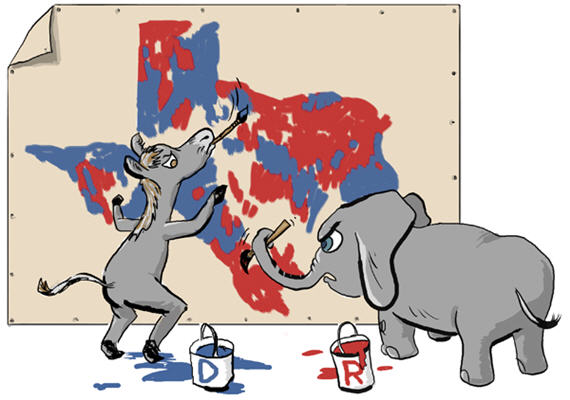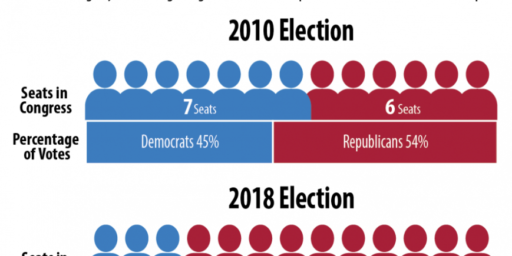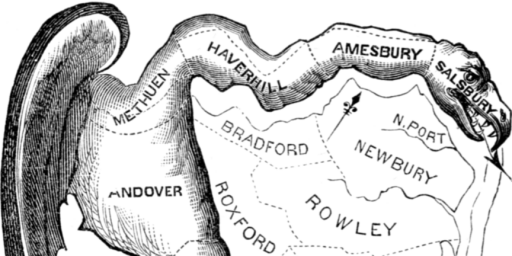Supreme Court Approves States Outsourcing Redistricting to Commissions
SCOTUS has upheld the use of election commissions to draw Congressional district lines.
The Supreme Court has upheld the use of election commissions to draw Congressional districting lines.
AP (“Justices uphold Arizona’s system for redistricting“):
The Supreme Court on Monday upheld the power of independent commissions used by 13 states to draw congressional districts, in a ruling that could spur efforts in other states to reduce partisan influence in the creation of electoral districts.
The justices voted 5-4 to reject a constitutional challenge from Arizona’s Republican lawmakers to the commission that the state’s voters created in 2000. Among the other states affected is California, which uses an independent commission to draw electoral boundaries for its largest-in-the-nation congressional delegation.
“Arizona voters sought to restore the core principle that the voters should choose their representatives, not the other way around,” Justice Ruth Bader Ginsburg said in her opinion for the court.
Ginsburg said that there is “no constitutional barrier to a state’s empowerment of its people by embracing that form of lawmaking.” Justice Anthony Kennedy and Ginsburg’s three liberal colleagues joined her opinion.
In dissent, Chief Justice John Roberts accused the majority of approving a “deliberate constitutional evasion.”
“The court’s position has no basis in the text, structure, or history of the Constitution, and it contradicts precedents from both Congress and this court,” Roberts said. Justices Samuel Alito, Antonin Scalia and Clarence Thomas signed onto Roberts’ opinion.
[…]
The argument against independent commissions rests in the Constitution’s Election Clause, which gives state legislatures the power to set “the times, places and manners of holding elections for senators and representatives.”
States are required to re-draw maps for congressional and state legislative districts to account for population changes after the once-a-decade census.
Some states have sought to rein in lawmakers’ power over drawing political boundaries because the justices have been unwilling to limit excessive partisanship in redistricting, known as gerrymandering. A gerrymander is a district that is intentionally drawn, and sometimes oddly shaped, to favor one political party.
This practice has been around awhile now and I didn’t realize the legality was even in dispute. The Election Clause merely states that “The times, places and manner of holding elections for Senators and Representatives, shall be prescribed in each state by the legislature thereof; but the Congress may at any time by law make or alter such regulations, except as to the places of choosing Senators.” So long as Arizona’s legislature passes into law the results of the commission’s work, they’re in fact “prescribing” the district lines.
Were the court to have ruled otherwise would have, logically speaking, upended the entire framework of modern government. After all, almost all of the power assigned to “The Congress” in Article I, Section 8 is in fact exercised on a day-to-day basis by various Executive bureaucracies under the mandate of Congress. Congress itself has, if anything, cursory oversight over such things as regulating commerce with foreign nations, establishing post offices and post roads, promoting the progress of science and the useful arts, making rules for the regulation of land forces, and all the rest.
More directly, Congress frequently outsources the writing of legislation—mostly to staffers but also to the aforementioned Executive bureaucracies and not infrequently to outside lobbying groups. While the latter, in particular, often comes under fire it ultimately doesn’t matter given that Congress itself ultimately has to pass the measures before they go into law.
For that matter, the judicial oversight of the redistricting in the states still subject to it under the Civil Rights Act of 1965 would be plainly unconstitutional.
UPDATE: A commenter points out that the situation in Arizona is more complicated than portrayed by the AP article and that, in fact, the state legislature is entirely bypassed. SCOTUSBlog’s Lyle Denniston:
In Arizona, the voters in 2000 reacted to a series of troubles in drawing new election districts by approving Proposition 106. Every redistricting cycle in the state since the 1970s, Justice Ginsburg noted, had “sparked controversy,” with several plans failing in court tests.
The ballot measure specifically targeted “the practice of gerrymandering” and cited a need to improve voter and candidate participation in elections. The state constitution was altered to take the congressional districting power away from the legislature, and turn it over to a five-member Arizona Independent Redistricting Commission.
While the state legislature can make suggestions, the commission need not follow them, and the maps that it draws for electing members of the Arizona delegation in the House of Representatives are binding and cannot be altered by the legislature.
On its face, that’s blatantly unconstitutional. Denniston explains Ginsburg’s reasoning as to why it’s not:
In making its decision, the Court noted that studies show that giving the task of drawing election districts to nonpartisan or bipartisan commissions leads to “districts both more competitive and more likely to survive legal challenge.” It has been noted widely that, due mainly to partisan gerrymandering by state legislatures in recent years, not many seats in today’s House of Representatives remain competitive at election time.
The majority’s opinion, written by Justice Ruth Bader Ginsburg, displayed a keen awareness of the activity of partisan gerrymandering, and noted that even the Founder deemed the “father of the Constitution,” James Madison, was worried about it in the dawn of the constitutional era.
“The problem Madison identified,” Ginsburg wrote, “has hardly lessened over time.” She made a pointed reference to “the current climate of heightened partisanship.”
In fact, she referred to party-driven redistricting as a “problem” in the very opening words of her opinion, and noted immediately that the Supreme Court had sharply criticized the practice even as it chose to do nothing itself about it because it could not find a “workable standard” to support a constitutional limitation.
While putting the problem in the hands of a state’s voters, if they are willing, the decision also amounted to a strong reaffirmation of the concept of direct democracy — that is, giving a state’s voters the authority to pass laws that they want and the authority to veto those that their legislature passes but they do not want. The decision gave an expansive interpretation of the phrase “state legislature” in the federal Constitution and in a federal law dividing up power between Congress and the states in writing laws to govern elections to Congress and the presidency.
That is a strained ruling, indeed. Essentially, Ginsburg and her co-signers are saying that citizens, through the referendum process, are acting as a de facto state legislature. While that’s not an absurd argument, it’s a hell of a stretch.






Sanity has prevailed over gerrymandering.
I’ve been on the SCOTUSblog live feed every morning for the past 3 weekdays (Thurs, Fri, and today). While I was happy about the outcome of the ACA and Gay Marriage cases last week, truth be told they don’t really have much effect on me personally one way or another. This is the case that I was sincerely interested in. I currently live in Arizona, and I vote in what is one of like a dozen truly competitive districts (AZ-2) in the entire country. Since I’m in the more conservative part of that district, if this decision had gone the other way, there’s a good chance that after the lines were redrawn, the only opportunity I’d have to express my voice would be in the Republican primary.
It was in dispute because it has the potential to make redistricting fair. What majority party wants that?
This is not how it works in Arizona. The Legislature did not “outsource” redistricting to a commission. The Redistricting Commission was established via ballot initiative following the 2000 redistricting. Furthermore, the Legislature does not pass into law the results of the commission’s work. The Legislature has absolutely no part of the process. Which is why this is blatantly unconsitutional.
The issue wasn’t the commission, per se. The key issue, as I understand it, is that Arizona’s citizenry created the commission by direct initiative. Other commissions, IIRC, are creatures created by the state legislatures.
Why would the Legislature need to be involved once the commission was created? It seems the initiative / referendum fulfilled that part of the requirement when it was first passed.
I wonder why people get excited about these issues. Given the demographic changes of the U.S., there will be competitive elections in fewer districts. Look at how California has become a one party state even thought it has commission driven restricting and top two primaries.
The future of restricting will not be creating districts that are competitive between Democrats and Republicans but creating districts that a representative of the proper racial or ethnic group so that the legislature will have the proper level of diversity. So while everyone is concentrating on the red/blue angle of the story, they probably should be concentrating the social engineering aspects of redistricting.
Off Topic – Dr Joyner it is good to see you post more today – I have missed your perspective on issues. Which is not meant to belittle Mr. Mataconis’s or Dr. Taylor’s contributions in any way.
Thank you all for maintaining this site and it’s content.
@superdestroyer:
How is this a bad outcome? The electorate is making a rational choice given the options. If it was gerrymandered they wouldn’t even have the choice.
Why should anyone want to ensure a minimum level of GOP representation against the wishes of the electorate?
@David M: He is ignoring the fact that Californians are clearly expressing their will through the ballot box. That privilege is reserved for white men of property.
@Gavrilo:
In other words, “the court didn’t rule as I think it should have ruled.”
@David M: I have read on the internet (where no one ever lies) that the Repubs got a much better deal from the CA redistricting than they were likely to have gotten through the Dem-controlled legislature.
@David M: @HarvardLaw92: I’m not understanding the hostility to @Gavrilo‘s comment. He’s issuing a factual corrective to my post, which was based on the short AP summary rather than the opinion itself. I’ve issued an update to the post reflecting the facts.
I don’t think it’s a slam dunk that it’s “blatantly unconstitutional” for an independent commission to totally bypass the legislature but it certainly goes against both the plain meaning and understood intent of the Clause. That the voters, through the initiative process, are acting as a de facto legislature isn’t laughable but it’s certainly novel.
@David M:
One of the main justifications for commission redistricting is to prevent gerrymandering and have competitive elections. However, California just draws the districts to insure the proper ethnicity wins. Look at the 29th District in California that was drawn to force Representatives Schiff and Berman into the same district so the Latinos would elect a Latino Democrat. The result was the election of Tony Cardenas with 74% of the vote and who will now stay in the seat as long as he wants. https://en.wikipedia.org/wiki/Tony_C%C3%A1rdenas#U.S._House_of_Representatives
So the question is what is the long term purpose of non-partisan redistricting except to create a huge number of districts that will have a competitive election once a generation and to make the maintenance of a dominant party system without being obvious about it.
@JohnMcC:
In 2014 there was not a single competitive election for US Congress in California. That was probably the intent of having a redistricting commission even though no one will admit it.
@James Joyner:
I disagree. The clause empowers legislatures to determine the “time, place and manner of holding elections”.
When elections will be held, where voting locations will be situated and how the precincts will carry out their duties. It says nothing about the apportionment of districts, although that is probably implied.
It DOES, however, also stipulate that “the Congress may at any time by Law make
or alter such Regulations”.
Congress mandated in 2 U.S.C § 2a(c) that districts are prescribed by the laws of states. State constitutions are the highest authority of law within any individual state, ergo the controlling law with respect to the determination of districts becomes the dictates of those state constitutions.
Arizona’s constitution gives voters the power to enact constitutional amendments, and one of those amendments mandates that districts be determined by commission. There is honestly no controversy here.
The hostility comes from a combination of distaste for armchairs in general and libertarians in particular. I’ve had more than my fill of both of those lately, sorry.
@superdestroyer:
Which, folks in Darrell Issa’s district just north of me can tell you, is an entirely different idea than “California is a one-party state”.
@HarvardLaw92:
I’m generally in favor of redistricting commissions and suspicious of the referendum process, which cancel each other out in this case; I have no dog in the fight. I find Ginsburg’s opinion reasonable enough given both the legislative and judicial history. The opening to Roberts’ dissent is, however, pretty compelling:
I respect his opinion, but as I said, the clause has to be read in its entirety. It empowers Congress to change the rules via statute, which it has done. If Arizona doesn’t like the status quo, it should try to get 2a(c) repealed or changed.. It’s been operative law since the 1940s.
It boils down to, IMO, that Congress didn’t consider that body other than state legislatures would have the power to create state constitutional amendments, or for that matter state laws. It should have, considering that the concept of a ballot initiative is nothing new or novel. It’s been enshrined int he Arizona constitution from the beginning way back in 1912. AZ’s constitution gives the people of the state the power to create laws, create constitutional amendments, and to veto laws that have been passed by AZ’s legislature.
In short, the power to make these electoral determinations has been deferred by Congress, as Article 1 Section 4 gives it the power to do, to the laws – or more to the point the lawmaking body(s) of each state, not the legislatures of each state. Unfortunately for AZ, its constitution puts the people on an equal footing with its legislature with respect to the ability to make laws.
@James Joyner:
If you want to do some reading on the subject, SCOTUS has already spoken on these concepts, long ago.
Read:
Ohio ex rel. Davis v. Hildebrant 241 U.S. 565 (1916)
– and –
Smiley v. Holm, 285 U.S. 355 (1932)
Davis is especially relevant.
The key concept in play here is NOT whether the IRC can be considered to be a legislature within the scope of the usage of that term within the US Constitution, but instead whether the Arizona ELECTORATE can be considered to be such a legislature for the purposes of the Election Clause.
Given the broad powers granted to the people of Arizona by their constitution with respect to making (and indeed, unmaking) law, I believe the appropriate answer to that question is “yes”.
And that’s the ballgame.
@HarvardLaw92:
That was my understanding of Ginsburg’s argument and it’s reasonable enough.
I disagree with the jurisprudence on what the two subclauses of the Elections Clause mean. That Congress can override regulations made by state legislatures doesn’t mean Congress can override the Constitution’s requirement that the legislatures set the time, manner, and condition. I’m more amenable to the idea that “legislature” can mean direct democracy, given that the legislature’s function is to represent the people.
HL92 is right. The American Constitution mentions “State Legislatures” but not what a State Legislature should mean. There are many Constitutions that are pretty specific about that. The American Constitution is not one of them. In a broad sense(and in a Federalist system) the Legislature is the body that makes laws.